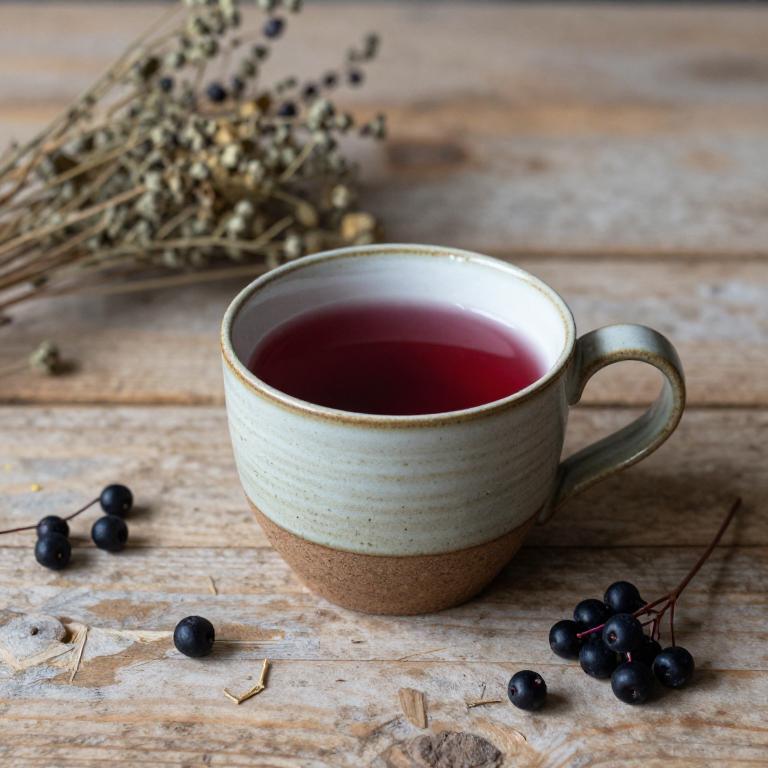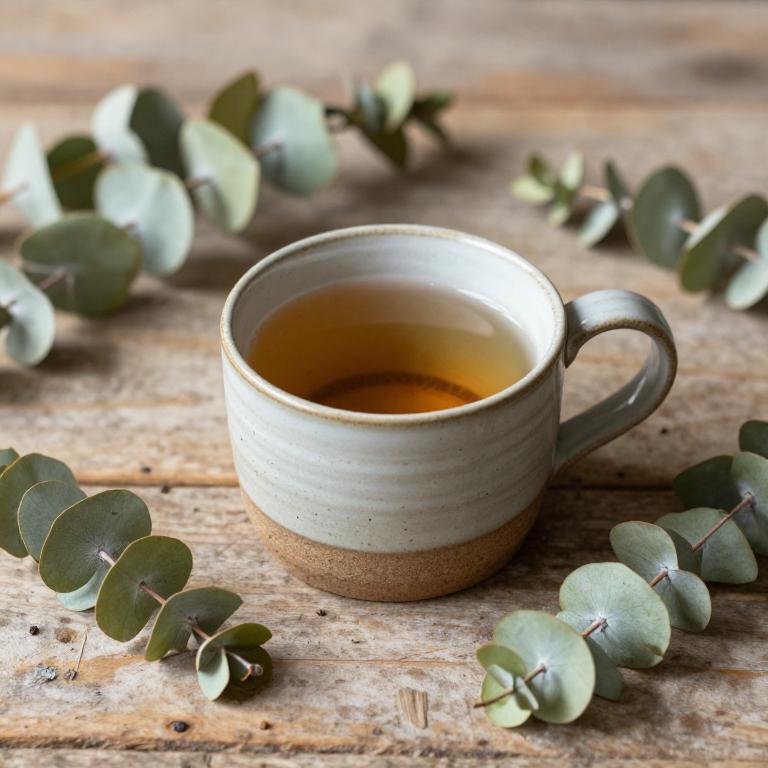10 Best Herbal Teas For Tickling Throat

Herbal teas can be a soothing remedy for a tickling throat, offering natural relief without the side effects of over-the-counter medications.
Ingredients like chamomile, licorice root, and slippery elm are commonly used due to their anti-inflammatory and demulcent properties, which help coat and calm the throat lining. These teas work by reducing irritation and excess mucus, making them particularly effective for conditions like sore throats or minor coughs. To prepare, simply steep a few teaspoons of dried herbs in hot water for several minutes, then strain and drink warm.
Regular consumption of these herbal teas can provide gentle, long-lasting relief and support overall respiratory health.
Table of Contents
- 1. Chamomile (Matricaria chamomilla)
- 2. Thyme (Thymus vulgaris)
- 3. Stinging nettle (Urtica dioica)
- 4. Salvia (Salvia officinalis)
- 5. Fennel (Foeniculum vulgare)
- 6. Rosemary (Rosmarinus officinalis)
- 7. Black elderberry (Sambucus nigra)
- 8. Ginger (Zingiber officinale)
- 9. Eucalyptus (Eucalyptus globulus)
- 10. Echinacea (Echinacea purpurea)
1. Chamomile (Matricaria chamomilla)

Matricaria chamomilla, commonly known as chamomile, is a popular herbal tea often used for its soothing properties.
It is particularly beneficial for alleviating a tickling throat due to its anti-inflammatory and mild sedative effects. The tea can help reduce irritation and inflammation in the throat, providing relief from coughing and discomfort. Chamomile tea is easy to prepare, simply by steeping dried flowers in hot water for several minutes.
Regular consumption of chamomile tea may also support overall respiratory health and promote relaxation, making it a natural remedy for throat-related discomfort.
2. Thyme (Thymus vulgaris)

Thymus vulgaris, commonly known as thyme, is a popular herb used in herbal teas to soothe a tickling throat due to its antimicrobial and anti-inflammatory properties.
The essential oils in thyme, particularly thymol, help reduce mucus production and ease irritation in the throat, providing natural relief for coughs and soreness. When brewed into a tea, thyme can be combined with other herbs like ginger or licorice to enhance its soothing effects. This herbal remedy is often recommended for those seeking a natural alternative to over-the-counter cough suppressants.
However, it is important to consult a healthcare provider before using thyme tea, especially for pregnant individuals or those with existing medical conditions.
3. Stinging nettle (Urtica dioica)

Urtica dioica, commonly known as stinging nettle, is often used in herbal teas to soothe a tickling throat due to its anti-inflammatory and soothing properties.
The leaves of the plant contain compounds that can help reduce irritation and inflammation in the throat, providing relief from coughing and soreness. When brewed into a tea, stinging nettle can be consumed warm to ease discomfort and promote a sense of calm. However, it is important to use the herb in moderation and consult a healthcare professional, especially for those with allergies or existing medical conditions.
This herbal remedy is a natural alternative for those seeking relief from throat irritation without the use of pharmaceuticals.
4. Salvia (Salvia officinalis)

Salvia officinalis, commonly known as sage, is a traditional herbal remedy often used in herbal teas to soothe a tickling throat.
Its anti-inflammatory and antimicrobial properties help reduce irritation and combat potential infections in the throat. Sage tea is typically prepared by steeping dried leaves in hot water, allowing the soothing compounds to infuse into the liquid. Many people find that drinking sage tea provides relief from persistent coughing and throat discomfort.
While it is generally safe, it is advisable to consult a healthcare professional before using it, especially for prolonged periods or in combination with other medications.
5. Fennel (Foeniculum vulgare)

Foeniculum vulgare, commonly known as fennel, is a popular herb used in herbal teas to soothe a tickling throat.
The tea is made by steeping the dried seeds of the fennel plant in hot water, releasing its aromatic compounds and mild medicinal properties. Fennel tea is valued for its ability to reduce inflammation and ease respiratory discomfort, making it a natural remedy for coughing and throat irritation. It contains compounds like anethole, which have antispasmodic and expectorant effects, helping to loosen mucus and ease breathing.
Regular consumption of fennel tea can provide relief from persistent throat irritation and support overall respiratory health.
6. Rosemary (Rosmarinus officinalis)

Rosmarinus officinalis, commonly known as rosemary, is a fragrant herb often used in herbal teas to soothe a tickling throat.
The essential oils in rosemary, such as camphor and pinene, have antimicrobial and anti-inflammatory properties that can help reduce irritation and inflammation in the throat. Drinking rosemary tea can provide a warming effect that may ease coughing and discomfort associated with a sore throat. It is often combined with other herbs like thyme or peppermint to enhance its soothing properties.
However, it is important to consult a healthcare professional before using rosemary tea, especially for those with allergies or underlying health conditions.
7. Black elderberry (Sambucus nigra)

Sambucus nigra, commonly known as elderberry, is often used in herbal teas to soothe a tickling throat due to its anti-inflammatory and antioxidant properties.
The tea is made by steeping dried elderberries in hot water, which can help reduce irritation and mucus production in the throat. It is believed to support the immune system, making it a popular remedy during cold and flu season. However, it is important to use only ripe, cooked elderberries to avoid toxicity, as raw berries can be harmful.
While some people find relief from symptoms, it is advisable to consult a healthcare professional before using elderberry tea, especially for prolonged or severe throat discomfort.
8. Ginger (Zingiber officinale)

Zingiber officinale, commonly known as ginger, is a popular herbal tea used to soothe a tickling throat due to its anti-inflammatory and antimicrobial properties.
The warming effect of ginger tea helps to reduce irritation and inflammation in the throat, making it a natural remedy for soreness and coughing. It also acts as a mild expectorant, helping to loosen mucus and ease breathing. To prepare the tea, simply steep fresh or dried ginger root in hot water for several minutes.
Regular consumption of ginger tea can provide relief from throat discomfort and support overall respiratory health.
9. Eucalyptus (Eucalyptus globulus)

Eucalyptus globulus, commonly known as eucalyptus or Australian tea tree, is often used in herbal teas to soothe a tickling throat due to its anti-inflammatory and expectorant properties.
The essential oil of eucalyptus globulus contains compounds like cineole and limonene, which help reduce mucus buildup and ease respiratory discomfort. When brewed into a herbal tea, it can provide a calming effect on the throat and help alleviate symptoms of coughing and irritation. This tea is particularly beneficial for those suffering from colds, bronchitis, or seasonal allergies.
However, it is important to consult with a healthcare professional before using eucalyptus globulus, especially during pregnancy or for individuals with certain medical conditions.
10. Echinacea (Echinacea purpurea)

Echinacea purpurea, commonly known as purple coneflower, is a popular herbal remedy often used to support the immune system and alleviate symptoms of respiratory infections.
When brewed into a tea, echinacea purpurea may help soothe a tickling throat by reducing inflammation and promoting mucus clearance. Its anti-inflammatory and antimicrobial properties are believed to contribute to its effectiveness in easing throat irritation. Many people find that drinking echinacea tea regularly can provide relief from mild throat discomfort and support overall respiratory health.
However, it is advisable to consult a healthcare professional before using echinacea, especially for those with allergies or chronic conditions.